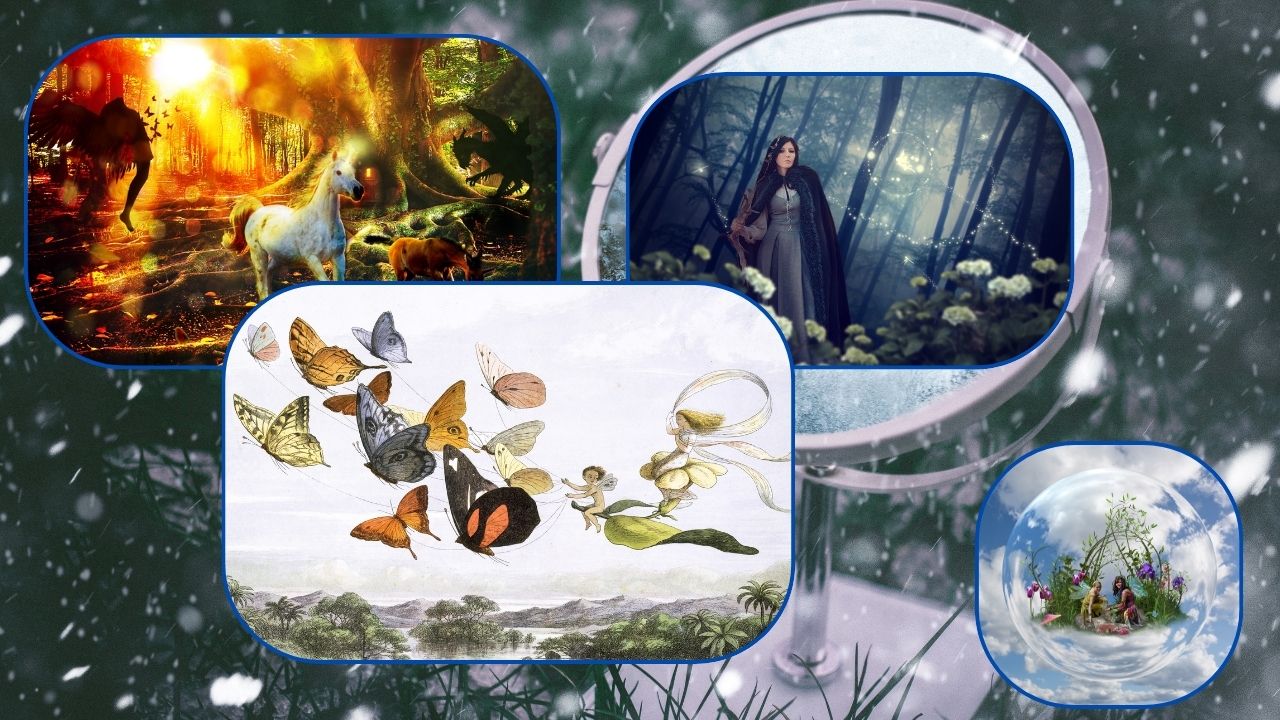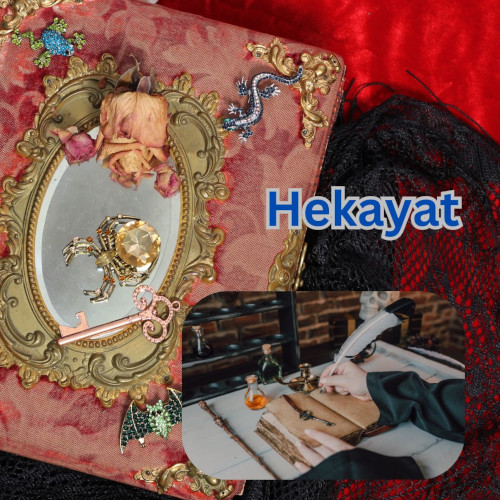Hekayat 33 from Chapter 2 of Golestan of Saadi

English Translation for Hekayat
One of the ascetics lived in the forest and ate the leaves of trees.
A king, wishing to visit him, approached and said: “If you see fit, come to the city. I will provide you with a place where you can worship in peace, and others can benefit from your presence and follow your righteous example.”
The ascetic did not accept this offer and turned away.
One of the ministers said: “It would be respectful to the king to come to the city for a few days and see the place. If the company of others disturbs your peace, you can always return.”
It is said that the ascetic came to the city and was given a beautiful garden residence by the king, a delightful and restful place.
Its red flowers like the cheeks of the beautiful
Its hyacinths like the locks of beloveds
Still untouched by the harshness of old age
Like a child not yet weaned
And its branches adorned with pomegranate blossoms
As if fire was hanging from the green trees
The king immediately sent a beautiful maid to him;
A piece of the moon, a deceiver of ascetics
An angelic face, a peacock in beauty
After seeing her, no ascetic could remain patient
Following her, a handsome, well-proportioned young man:
People around him perished of thirst
While he, the water-bearer, saw but did not give
One could not get enough of looking at him
Like someone thirsty at the Euphrates
The ascetic began to eat delicious foods, wear fine clothes, enjoy fruits, perfumes, and sweets, and gaze at the beauty of the maid and the young man. The wise have said: The locks of the beautiful are chains for the feet of reason and traps for the clever bird.
I gave my heart and faith to your work with all my knowledge
Today, I am the clever bird, and you are the trap
In short, the prosperity of the time came to an end. As the poet says:
Whoever is a scholar, elder, or disciple
And among the eloquent pure-breathed ones
When they descend to the lowly world
They get stuck in the honey like a fly
The king desired to see him again.
He saw the ascetic had changed from his former state, becoming rosy and plump, reclining on a silk cushion, with a fairy-like servant standing with a peacock-feather fan over his head;
He rejoiced at his well-being and spoke of many things until the king said: “No one in the world loves these two groups as much as I do: the scholars and the ascetics.”
The wise, experienced minister with him said: “O Lord! The condition of friendship is to do good to both groups, give money to the scholars so they continue to read, and give nothing to the ascetics so they remain ascetic.”
A beautiful, clean-faced lady
Do not adorn her with jewels and turquoise rings
A good-natured, clean-hearted dervish
Do not give him the bread of the monastery and the morsel of charity
As long as I have and need more
If they do not call me an ascetic, it is fine
متن حکایت
یکی از مُتَعَبِّدان در بیشه زندگانی کردی و برگِ درختان خوردی.
پادشاهی به حکمِ زیارت به نزدیک وی رفت و گفت: اگر مصلحت بینی به شهر اندر، برای تو مَقامی بسازم که فَراغِ عبادت از این به دست دهد و دیگران هم به برکت اَنفاس شما مُسْتَفید گردند و به صَلاح اعمال شما اقتدا کنند.
زاهد را این سخن قبول نیامد و روی برتافت.
یکی از وزیران گفتش: پاسِ خاطر ملِک را روا باشد که چند روزی به شهر اندر آیی و کیفیّتِ مکان معلوم کنی، پس اگر صفایِ وقتِ عزیزان را از صحبتِ اَغیار کدورتی باشد، اختیار باقیست.
آوردهاند که عابد به شهر اندر آمد و بستانسرای خاصِّ ملک را بدو پرداختند، مقامی دلگشای، روان آسای.
گلِ سرخش چو عارضِ خوبان
سنبلش همچو زلفِ محبوبان
همچنان از نهیب بَرْدِ عَجوز
شیر ناخورده طفلِ دایه هنوز
وَ اَفاِنینُ عَلَیْها جُلَّنارْ
عُلِّقَتْ بِالشَّجَرِ الاَخْضَرِ نارْ
ملِک در حال، کنیزکی خوبروی پیش فرستاد؛
ازین مه پارهای، عابد فریبی
ملایک صورتی، طاووس زیبی
که بعد از دیدنش صورت نبندد
وجودِ پارسایان را شکیبی
همچنین در عقبش غلامی بدیعالجمال، لطیفالاعتدال:
هَلَکَ النّاسُ حَوْلَهُ عَطَشاً
وَ هْوَ ساقٍ یَرَیٰ وَ لاٰ یَسْقی
دیده از دیدنش نگشتی سیر
همچنان کز فرات، مُسْتَسْقی
عابد طعامهای لذیذ خوردن گرفت، و کسوتهایِ لطیف پوشیدن و از فَواکه و مَشموم و حَلاوات تمتّع یافتن و در جمالِ غلام و کنیزک نظر کردن و خردمندان گفتهاند: زلفِ خوبان زنجیرِ پایِ عقل است و دامِ مرغِ زیرک.
در سرِ کارِ تو کردم دل و دین با همه دانش
مرغِ زیرک به حقیقت منم امروز و تو دامی
فیالجمله دولتِ وقتِ مجموع به روزِ زوال آمد. چنان که شاعر گوید:
هر که هست از فقیه و پیر و مرید
وز زبان آورانِ پاک نَفَس
چون به دنیایِ دون فرود آید
به عسل در بماند پایِ مگس
بار دیگر ملِک به دیدن او رغبت کرد.
عابد را دید از هیأتِ نخستین بگردیده و سرخ و سپید بر آمده و فربه شده و بر بالشِ دیبا تکیه زده و غلام پریپیکر به مِرْوَحهٔ طاووسی بالای سر ایستاده؛
بر سلامتِ حالش شادمانی کرد و از هر دری سخن گفتند، تا ملک به انجام سخن گفت: چنین که من این هر دو طایفه را دوست دارم در جهان کس ندارد یکی علما و دیگر زُهّاد را.
وزیرِ فیلسوفِ جهاندیدهٔ حاذق که با او بود گفت: ای خداوند! شرطِ دوستی آن است که با هر دو طایفه نکویی کنی، عالمان را زر بده تا دیگر بخوانند و زاهدان را چیزی مده تا زاهد بمانند.
خاتونِ خوبصورتِ پاکیزهروی را
نقش و نگار و خاتمِ پیروزه گو مباش
درویشِ نیکسیرتِ پاکیزهخوی را
نانِ رِباط و لقمهٔ دریوزه، گو مباش
تا مرا هست و دیگرم باید
گر نخوانند زاهدم، شاید


